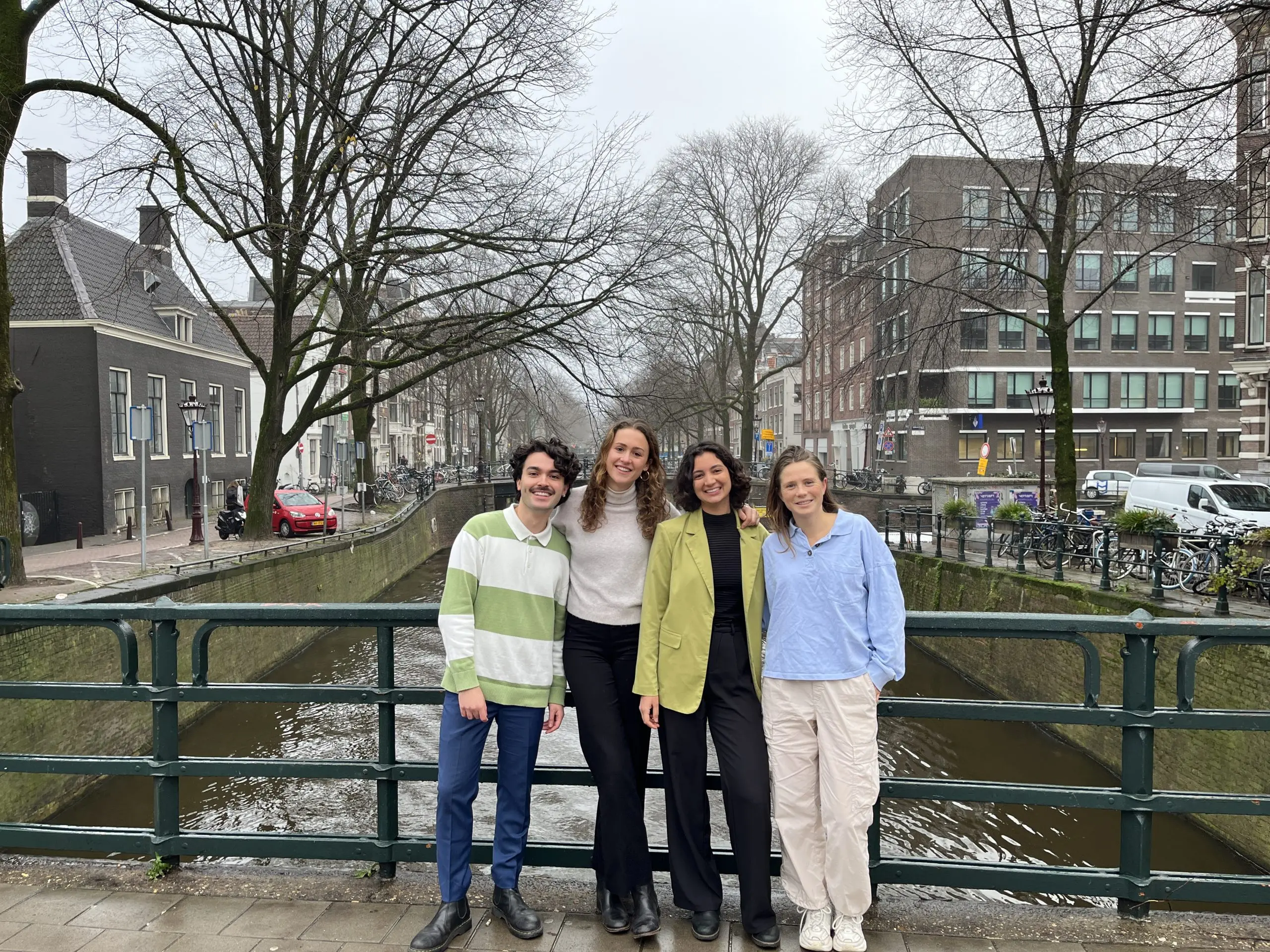Every autumn, 20 young minds tackle a pressing societal issue as part of the National Think Tank. This year’s challenge: creating a circular society. Four participants from TU Delft were part of the discussion.
Khalid El Haji, Isa van Tuyll, Jayanti Pos and Elisabeth van Berckel participated in the National Think Tank in Amsterdam. (Photo: Floris Durville)
Do you know what circularity is?
When participants of the National Think Tank, in collaboration with market research agency Motivation, surveyed public awareness of circularity, only one in five respondents had any clue. This finding was a wake-up call. Within academic circles, circularity – defined as the ability of a system to keep materials in use while minimizing waste and environmental harm through smart design and efficiency – is widely embraced as a noble goal. However, its broader resonance appears limited.
One of the key strengths of the National Think Tank is its ability to expose recent graduates to diverse perspectives. Just days before the final presentation, the participants from TU Delft had reflected on how valuable this experience had been.
- Jayanti Pos, a Technical Medicine master’s student, was struck by how differently the same problem can be viewed when approached from various angles.
- Isa van Tuyll, an Offshore Engineering graduate, observed that “not everyone responds to data”, but a compelling example can often be more effective.
- Khalid El Haji, a bachelor’s graduate in Industrial Design Engineering, discovered the value of open dialogue, finding countless people willing to share their ideas.
- Elisabeth van Berckel, a Biochemical Engineering graduate, also participated but was unable to attend the interview.
Barriers to circularity
From late August, these fresh thinkers spent four months delving into the concept of a circular society – two months exploring the problem, followed by two months developing solutions. Their focus areas included healthcare, electronics, housing and construction, and consumer behaviour regarding furniture.
In their research, several obstacles to circularity emerged. For example, circularity is not a priority in healthcare procurement; reliability, cost, and supply security take precedence. Many businesses also focus on short-term goals and show little interest in the ‘end-of-life’ stage of their products. Furthermore, recycled materials often suffer from a perception of being inferior in quality.
Solutions
In healthcare, the team that included Khalid El Haji, found strong interest in circularity among providers and volunteers. “There’s a lot of green ambition,” he noted. To turn good intentions into action, they proposed embedding circularity into quality standards. The Health and Youth Care Inspectorate has already expressed a willingness to oversee this. El Haji doesn’t view the associated quality requirements as coercive. “Everyone’s on the same page. We’re simply jump-starting circularity.”
In electronics, Jayanti Pos highlighted the idea of a user-friendly ‘repair-simple’ website to connect people with broken phones or laptops to local repair services. While repair businesses do exist, they are often hard to find. Although there already is a National Register of Repairers (in Dutch), it functions more like a directory for businesses than a tool for consumers. A dedicated repair-simple website could direct people toward repair rather than replacement.
Isa van Tuyll worked with the group focused on construction, where the flow of materials remains largely linear – from supplier to contractor to demolition. To close the loop, the Think Tank proposed redirecting materials from demolition sites back to suppliers. “Of course, there are criteria that have to be met,” Van Tuyll explained. “Materials need to be high quality, easy to dismantle, transportable, locally reusable, and so on. But once we identify good reusable materials, we’ll arrange agreements with demolition companies to deliver them to us, and we’ll return them to suppliers.” Two Think Tank participants are even planning to start a business in reusable building materials.
A society in transition
Each year, the National Think Tank seeks out pressing societal issues and works with 20 young talents from vocational, higher professional, and university education to explore fresh opportunities in collaboration with citizens, policymakers, entrepreneurs, and researchers. Recent themes have included education, biodiversity, ageing, and now the circular society. Next year, fittingly, the focus will return to circularity and sustainability – with a fresh twist.
- Want to learn more or get involved? Visit the Nationale Denktank (in Dutch).
Do you have a question or comment about this article?
j.w.wassink@tudelft.nl


Comments are closed.